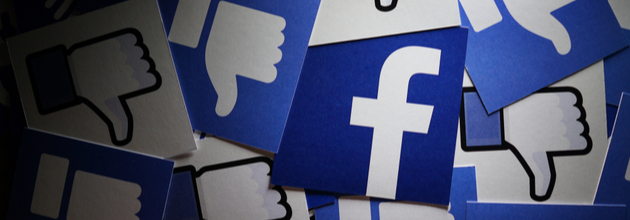 | Read in Browser |
 |
 |
| | Top News  Shutterstock The pressure on Facebook (NASDAQ: FB) is not letting up following a three-hour Senate hearing last week in which lawmakers grilled the social media giant over its harmful effects on young people. Over the weekend, a Facebook whistleblower named Frances Haugen, who leaked the docs for the WSJ's "Facebook Files," accused the company of repeatedly prioritizing profit over clamping down on hate speech and misinformation. Her lawyers have already filed at least eight complaints with the SEC, according to the interview on CBS's 60 Minutes. Quote: "The thing I saw at Facebook over and over again was there were conflicts of interest between what was good for the public and what was good for Facebook," said Haugen, who worked as a product manager on the civic misinformation team. "Facebook, over and over again, chose to optimize for its own interests, like making more money. It is subsidizing, it is paying for its profits with our safety." Haugen even went as far as to suggest the moneymaking moves contributed to the deadly Jan. 6 storming of the U.S. Capitol (after the company prematurely disbanded its Civic Integrity team designed to thwart misinformation). She'll also testify before a Senate subcommittee tomorrow in a hearing titled "Protecting Kids Online" and hopes her statements will result in "regulation being put into place." Facebook's annual revenue has more than doubled from the $56B seen in 2018, when a newsfeed content flow change went into effect. The new algorithm has fostered discord, according to Haugen, while contributing to more divisiveness on a network meant to bring people together. Response from Facebook: "Every day our teams have to balance protecting the ability of billions of people to express themselves openly with the need to keep our platform a safe and positive place," Facebook spokesperson Lena Pietsch said in a statement. "We continue to make significant improvements to tackle the spread of misinformation and harmful content. To suggest we encourage bad content and do nothing is just not true." ( 18 comments) | | Stocks Get ready for a volatile October... The month, traditionally known for its ups and downs, didn't disappoint traders overnight. S&P 500 futures opened the session solidly in the green on Sunday evening, only to fall 0.7%, before heading back to the flatline. Contracts linked to the DJIA moved in line with the benchmark index, while the Nasdaq saw even steeper price swings. While the main focus this week will be ADP's September employment report and the non-farm payrolls report for last month, investors are also sizing up what kind of returns could be in store for the rest of the quarter: The bulls: "Q4 2021 will likely record a higher-than-average return," noted CFRA chief investment strategist Sam Stovall. "However, investors will need to hang on tight during the typically tumultuous ride in October, which saw 36% higher volatility when compared with the average for the other 11 months." The bears: "We're headed for some trouble ahead," declared Wharton finance professor Jeremy Siegel, who's known for his positive market forecasts. "Inflation, in general, is going to be a much bigger problem than the Fed believes. I do not believe that the market is prepared for an accelerated taper." Macro front: Echoes of the trade war were heard overnight as U.S. trade representative Katherine Tai vowed to enforce Phase 1 of the trade deal with China. Under the pact, Beijing pledged to buy at least $200B more U.S. goods and services over 2020 and 2021, compared to 2017, though as of August, China had only reached 62% of that target, based on export data compiled by the Peterson Institute for International Economics. Tai also said there were "serious concerns" about the country's "state-centered and non-market trade practices" - which were not addressed under the current framework - but would "raise these broader policy concerns with Beijing." ( 2 comments) | | Sponsored By StartEngine  With a goal to help raise $10 billion by 2029, StartEngine has big plans... and they're already gaining momentum: - 146% revenue growth YoY in the first half of 2021.
- 500,000 prospective investors on the platform
- Led by Howard Marks, co-founder of Activision (NASDAQ:ATVI).
- Launched a first-of-its-kind trading platform
- $400M raised for more than 500 companies.
- Moving into wine collections, real estate, and more
Now you can join 22,000 other investors and invest in StartEngine itself. Check it out here for more information.
Disclaimer:Reg A+ offering made available through StartEngine Crowdfunding, Inc. Investment is speculative, illiquid, and involves a high degree of risk, including the possible loss of your entire investment. View StartEngine Crowdfunding, Inc's offering circular and selected risks. Past performance may not be indicative of future results.
| | Covid BioNTech (BNTX) CEO Ugur Sahin, whose company developed one of the first COVID-19 vaccines along with Pfizer (PFE), predicts that a new formula may be needed next year to protect against future virus mutations. While current variants, particularly the Delta strain, are leading to a surge in breakthrough cases, he said they're not different enough to undermine the effectiveness of current jabs. That could change, though, and the company is planning accordingly.
Thought bubble: One of the biggest differences between the flu vaccine and many other vaccines is that the flu evolves much quicker than viruses like polio and measles. If someone was vaccinated as a child against the latter diseases, it's extremely likely their body will recognize the disease at a much later date. While the scientific evidence is still pouring in on coronavirus, it may be closer to the flu in terms of its adaptability. "I think this virus is here to stay with us and it will evolve like influenza pandemic viruses," said Dr. Mike Ryan, executive director of the World Health Organization's Health Emergencies Program.
Sahin also made some other predictions. He sees two main streams of vaccination programs in 2022, including booster shots for those who have been vaccinated, as well as a continued push to vaccinate people who have had minimal access to them. Last month, the U.S. announced it would buy another 500M doses of the BioNTech/Pfizer vaccine at not-for-profit rates to give to lower-income countries. Shares of BNTX have surged more than 200% YTD amid vaccine developments, booster shots and FDA authorization, while PFE has gained around 17%.
Go deeper: Vaccine makers are on the backfoot again this morning after Merck & Co. (MRK) dropped a bomb in the global fight against COVID-19 on Friday. Results from Merck's experimental pill cut the risk of hospitalization and death from COVID in half, and were so encouraging that it stopped enrolling patients to begin the process of regulatory approval. The pill, which is most effective when given early in course of infection, is also said to work against all COVID variants including Delta. (13 comments)
| | Energy An energy supply crunch that has led to gas lines in the U.K. and China to secure supplies "at all cost" is prompting investors to closely watch the sector. The latest headlines could come today as OPEC+ holds a virtual meeting to review its output policy. In July, the group led by Saudi Arabia and Russia agreed to boost monthly output by 400K barrels per day until at least April 2022, phasing out 5.8M bpd in cuts. Chatter before the gathering: OPEC+ may consider going beyond its existing deal to boost production by another 400K barrels per day. There are even suggestions for an increase of 800K bpd for one month, with zero the next month, while other delegates feel there is currently no need to take extraordinary measures. The nearest month any increase could occur is November since OPEC+'s last meeting decided the October volumes. "Obviously, the price of oil is of concern," White House Press Secretary Jen Psaki said this past Thursday, adding that the U.S. was talking to OPEC and looking at every tool to address its cost. Some see the request as hypocritical, as the country discourages drilling at home in its fight against climate change, while others see it as a stopgap measure until the U.S. transitions away from fossil fuels toward cleaner energy sources. President Biden has set a goal to decarbonize the economy by 2050 and has paused new drilling lease auctions on federal lands pending a review of environmental and climate impacts. Elsewhere: One of the largest oil spills in recent Southern California history occurred over the weekend, with at least 126,000 gallons of oil leaking into the waters off Orange County. Local officials are calling it an environmental catastrophe as black globules along with dead birds and fish wash ashore. The spill was caused by a breach connected to the Elly oil rig, which was operated by a California subsidiary of Houston-based Amplify Energy Corporation ( AMPY). ( 13 comments) | | Today's Markets In Asia, Japan -1.1%. Hong Kong -2.2%. China closed. India +0.9%.
In Europe, at midday, London +0.2%. Paris +0.1%. Frankfurt -0.1%.
Futures at 6:20, Dow -0.3%. S&P -0.4%. Nasdaq -0.5%. Crude +0.1% at $75.94. Gold -0.5% at $1749.30. Bitcoin -0.5% at $47598.
Ten-year Treasury Yield +3 bps to 1.49%
Today's Economic Calendar | | | | | Seeking Alpha's Wall Street Breakfast Podcast Seeking Alpha's Wall Street Breakfast podcast brings you all the news you need to know for your market day. Released by 8:00 AM ET each morning, it is a quick listen that you can put on as you get ready to start your working day. | | | | |











EmoticonEmoticon